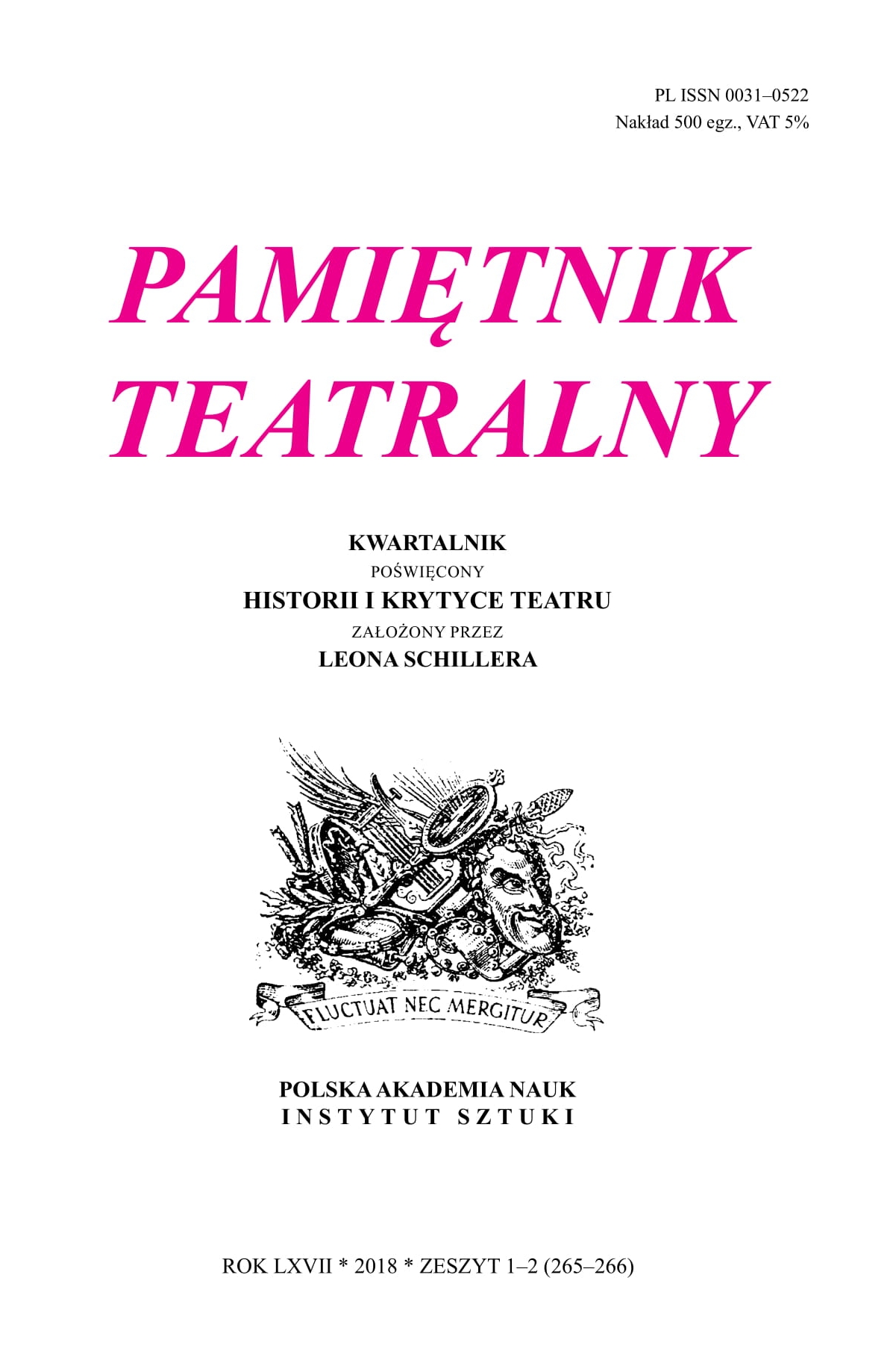Recenzja książki Ewy Partygi Ibsenowskie konstelacje. Ćwiczenia w patrzeniu i czytaniu (Instytut Sztuki Polskiej Akademii Nauk, Warszawa 2016)
A review of Ewa Partyga's book Ibsenowskie konstelacje. Ćwiczenia w patrzeniu i czytaniu (Institute of Art of the Polish Academy of Sciences, Warsaw 2016)
Author(s): Lech SokółSubject(s): Fine Arts / Performing Arts
Published by: Instytut Sztuki Polskiej Akademii Nauk
Keywords: Ibsen;Henrik Ibsen;Ibsen’s writings;theatre studies;cultural reception;
Summary/Abstract: The book discusses a lot of important problems, plunging right in from the very first words. At the outset, we are given a severe, yet just assessment of the Polish reception of Ibsen in theatre, literature, and literary criticism, with all the myths that have accumulated there. A full reception of his oeuvre that encompasses modern translations, artistically rich theatre reception, as well as truly competent theatre and academic criticism in conjunction with a deep audience response has only just begun in Poland. The book Ibsenowskie inspiracje is a part of this new wave. The author is a comparatist, theatre scholar, Scandinavian philologist, and translator of dramas and various other literary and scholarly texts not only from the Norwegian but also from Danish, Swedish, and English. So far, however, she has not translated any play by Ibsen! The constellations of problems referring to his dramas as well as to various literary, artistic, and philosophical contexts of his work that show his oeuvre from different angles encompass, to use the author’s terminology, visual, philosophical, Scandinavian, and Young Polish constellations. The author has a full grasp of the newest developments in Ibsen studies, and against that backdrop, her own readings and interpretations turn out to be quite original. Perhaps the most brilliant of them belong to the visual constellations, in which the author tackles the relationships between Ibsen and Munch, “Ibsen in the theatre of photography,” “photography in Ibsen’s dramas” (in her own original and enlightening way Partyga uses the album edited by Peter Larsen, and her take on Ibsen’s strategy of self-promotion is highly engaging), and the relationship between Ibsen, Munch, and Vilhelm Hammershøi. The philosophical constellations consist of only to essays. The first uncovers some striking parallels between Ibsen as the author of The Master Builder and Nietzsche as the author of On the Genealogy of Morals. The second text is equally important, because it deals with Ibsen and Kierkegaard. It is a parallel reading of Repetition and three of Ibsen’s dramas (Rosmersholm, Hedda Gabler, and The Master Builder) with a view to metatheatricality. The Scandinavian and Young Polish constellations can be discussed jointly, because they are structured in a similar way: they focus on the problem of reception of Ibsen’s work in the drama and theatre of Scandinavia and Poland respectively. The Scandinavian reception refers to drama and theatre, whereas the Polish one includes theatre and literary criticism as well. In this constellation, Partyga examines the problem of Ibsen’s presence in Ingmar Bergman’s theatre; it is the first Polish study on the topic. A lot of attention is given to the relation between Ibsen, Jon Fosse, and Cecilie Løveid. The Young Polish constellations bring important revisions of Polish myths about Ibsen. The author does justice to Gabriela Zapolska as an Ibsenian actress and deals a final blow to the myth of Tadeusz Pawlikowski as an alleged “Ibsenist.” Another interesting phenomenon is Stanisław Brzozowski who, according to Partyga’s assessment, did not read Ibsen thoroughly enough. Thus we have lost a chance for dialogue of the outstanding mind with Ibsen. There is also a highly illuminating essay about vocation in Ibsen and in Wyspiański. What both playwrights have in common is that they “search for a new, capacious form of drama and theatre that could come to terms with the complicated and difficult experience of modernity,” as the author puts it. In the reviewer’s opinion, her book is an outstanding one.
Journal: Pamiętnik Teatralny
- Issue Year: 266/2018
- Issue No: 1-2
- Page Range: 216-225
- Page Count: 10
- Language: Polish

